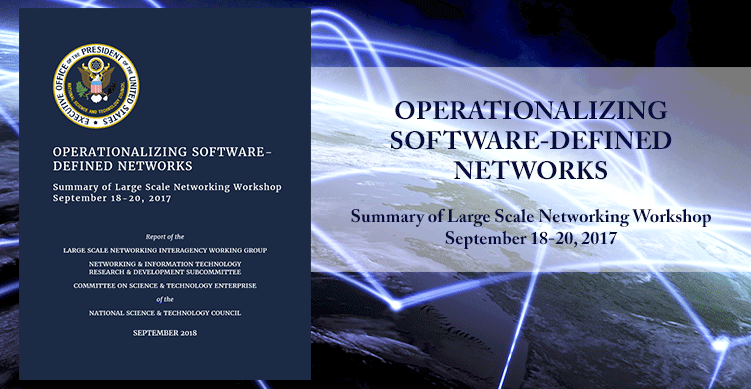View Full Text: Operationalizing-SDN-Report-2018.pdf
In the context of advancing technology development and innovation in support of American leadership in science and technology, software defined networking (SDN) enables broad flexibility in network programming and operation. In early SDN implementations, this flexibility has proved beneficial in supporting collaboration and innovation across university campuses and regional and national research and education networks. As a result, there is significant interest across academia, industry, and government in broadening SDN use, along with expanding R&D in enabling SDN technologies.
The Large Scale Networking Interagency Working Group held an Operationalizing Software-Defined Networks Workshop on September 18–20, 2017, in Washington, DC, as part of a series of SDN-focused workshops. At the Operationalizing SDN workshop, Federal, private, and academic stakeholders discussed the current state-of-the-art and path forward to realize an open, innovative, multidomain, and interoperable SDN as an operational infrastructure that can rapidly adjust to the evolving communication and computing needs of science, engineering, and commerce, while simultaneously enhancing the economics, security, evolution, and manageability of the network.
Workshop participants explored the following key needs for “operationalizing” SDNs in the following context:
- Enhanced SDN processes and architecture, including control- and data-plane separation, automatic configuration, operating models for network operators and end users, single-domain and multidomain control, security, needs-driven implementation strategies, diversity of network functions, and orchestration.
- Comprehensive SDN tools for verifying, debugging, monitoring performance, and testing.
- Management and operations support, including provisioning, integration, balancing, open application programming interfaces (APIs), network operations, authentication, monitoring, self-healing, resilience, reliability, high availability, and data analytics.
- Policies for interoperability, trust and verification, and authentication.
- Forums for collaboration, progress assessment, tool sharing, test suite development, and workforce development and training.
The “Operationalizing Software-Defined Networks” Report discusses SDN adoption and identification of key areas for further exploration, focusing on flexibly enabling end-to-end paths to network, compute, and storage resources with customizable properties, using software to easily assemble such paths across hardware infrastructure, with favorable economics, security, evolution, and operation manageability.


